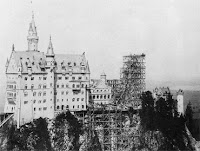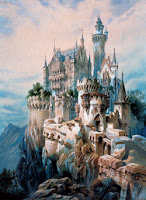
Sleeping Beauty's Castle at Disneyland.
There was a deep irony in Ludwig's sponsorship of Wagner - he adored the composer's operas only for their backward-looking plots and themes, not their musical and dramatic innovations. In short, he was a patron who contributed to the advance of his chosen art only accidentally. This shortcoming is even clearer in Ludwig's architectural pursuits: gorgeous as his castles may be, they are essentially sentimental attempts to revive lost styles, or even copy specific older buildings.
 Of course the late Victorian period was generally one in which architects revived and combined Gothic and Romanesque elements into lively pastiches; they usually did so, however, with an eye toward creating new, exotic juxtapositions. Indeed, the most talented architects were already creating new forms to match the technology used to build Neuschwanstein (above); even as the castle was completed, for instance, Louis Sullivan had begun building his famous skyscrapers in Chicago, and Frank Lloyd Wright had taken on his first clients. Ludwig, however, like a child who cries out to hear the same story over and over, had only attempted to recreate lost idylls.
Of course the late Victorian period was generally one in which architects revived and combined Gothic and Romanesque elements into lively pastiches; they usually did so, however, with an eye toward creating new, exotic juxtapositions. Indeed, the most talented architects were already creating new forms to match the technology used to build Neuschwanstein (above); even as the castle was completed, for instance, Louis Sullivan had begun building his famous skyscrapers in Chicago, and Frank Lloyd Wright had taken on his first clients. Ludwig, however, like a child who cries out to hear the same story over and over, had only attempted to recreate lost idylls.  This essential flight from reality makes the one case in which he was influential highly (if ironically) appropriate - Neuschwanstein provided the model for Sleeping Beauty's Castle at the entrance to Fantasyland in Disneyland (above); one synthetic castle inspired another.
This essential flight from reality makes the one case in which he was influential highly (if ironically) appropriate - Neuschwanstein provided the model for Sleeping Beauty's Castle at the entrance to Fantasyland in Disneyland (above); one synthetic castle inspired another. (Indeed, Ludwig would have topped anything Disney could have come up with if he had lived to build his next project, Castle Falkenstein - at right, in a sketch by Christopher Jank.)
This is what keeps Ludwig out of the architectural history books - and what makes Valhalla a tragicomedy, rather than a tragedy. There's something grand about Ludwig's folly, but also something silly - in the end, he was not a real artist, as he refused to genuinely engage with his own situation or time. He used the arts not to explore but to assuage, comfort, and aggrandize himself and his ego. In a way, of course, this only exposed his weaknesses all the more - his grandeur was faintly ridiculous, and somehow lonely and sad.
 Neuschwanstein in winter.
Neuschwanstein in winter.


No comments:
Post a Comment